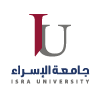Vision:
To become a leading school in nursing sciences, scientific research, and community partnership.
Mission:
To graduate competent nursing professionals prepared to provide comprehensive, high-quality nursing care for the clients, families, and communities as part of the interdisciplinary team in an ever-changing environment.
Core Values:
1. Pioneering
2. Transparency
3. Neutrality
4. Excellence and Creativity
5. Participation
6. Honesty
The Philosophy of the Faculty of Nursing
The philosophy of the Faculty of Nursing is consistent with that of the Ministry of Higher Education and Scientific Research (MoHESR), the Jordanian Nursing Council (JNC), and Isra University (IU). Our philosophy is founded on theories such as the "Humanistic Theory" and "Adult Learning Theory" since they aid in developing patterns that guide nursing education.
Isra University's Faculty of Nursing combines the concepts of nursing, person, health, environment, teaching, and learning in its curricula, promoting lifelong learning, empowerment, and caring.
We believe that students are recognized as whole individuals at the heart of the educational process. They have intrinsic dignity and need to be treated with respect and care. Students learn in open and adaptable systems, and they are in constant direct contact with the internal and external environments. Thus, their interdependent physical, psychological, emotional, sociocultural , spiritual, and developmental subsystems should be considered.
We believe that learning is a lifelong process that allows people to survive, mature, and achieve their personal goals. Each student has a unique learning style and particular goals and learning rates. When the ideal learning environment is provided, students can achieve their full potential.
Faculty members employ several instructional tactics to improve communication skills, feelings, critical thinking, research, artistic, and practical skills to optimize students' participation in the learning process. As a minimum requirement, faculty members give students detailed outlines. As a result, students improved their knowledge, abilities, and attitudes by using their curiosity, motivation, and newly taught talents.
The environment is critical in students' learning since it encompasses all the situations, circumstances, and influences impacting individual growth and behavior. By using diverse educational methodologies, including Concept-based Learning (CBL), Evidence-Based Practice (EBP), and the incorporation of health informatics and computer simulation, the ideal learning environment should cater to the learner's social, emotional, and cognitive requirements.
We believe that Nursing is a healthcare profession that combines the art of caring with nursing science to provide holistic, creative, and dynamic care to individuals, families, and communities. This art is delivered through the nursing process. Moreover, it is based on nursing theories and knowledge, current research evidence, client values, and nurse experiences. To promote health, manage the disease, and establish therapeutic nursing interventions, the professional nurse uses communication, critical thinking and clinical judgment, nursing values, and leadership skills to meet the requirements of global health and health economics. The main goal of Nursing is to enhance health and well-being by working collaboratively with other healthcare team members.
While recognizing health as a state of equilibrium between environmental stressors and the amount of energy and resources available to meet one's demands, the degree of equilibrium defines an individual's health. It is determined by individuals', families', and communities' abilities to adapt favorably to environmental pressures. The individuals' health status allows them to meet their demands while feeling well and caring for themselves and others.
As faculty members, we believe that nursing education is a multi-dimensional, collaborative process to develop competent, self-directed nurses with the necessary information, skills, and attitudes to function professionally.
We believe that nursing is a caring health profession; thus, its practice is based on knowledge, theories, and research. In turn, the excellence of the nursing profession depends on the generation of knowledge through scholarly inquiry and its dissemination in curricula that prepare students for lifelong learning, excellence, and leadership in nursing and society.
As health care providers, we understand the complexities of health as a sense of well-being, the ability to perform at one's best and adapt to changing circumstances throughout one's life. Therefore, individuals have the right to be involved in decisions that influence their health and well-being. Thus, specific nursing treatments should occur within a framework that recognizes cultural differences and customs.
Critical thinking is a basic competency of all professional nurses, and we, as educators, promote the development of these skills in undergraduate and graduate programs. We also feel that continuing education throughout one's career is critical in maintaining professional competency for Faculty and graduates, resulting in great employers' satisfaction.







